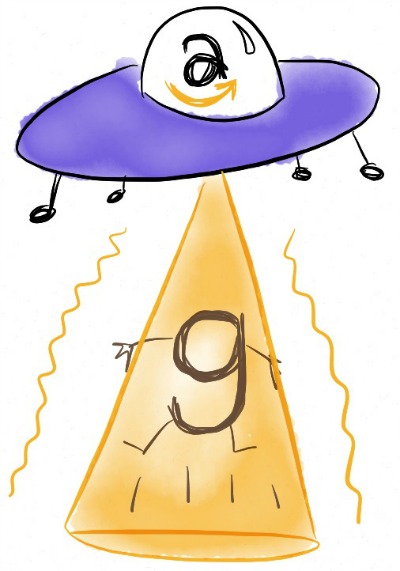
When word came out that Amazon was pulling social network Goodreads into its acquisitional tractor beam, reaction seemed to fall into one of two categories—either Big Brother Bezos (as in Amazon CEO Jeff) has again sprouted horns and can’t wait to get his hands on your user data, or chill pal “Jeff B.” is throwing on his Ray-Bans, giving one of those L.L. Cool J kiss-two-fingers-then-make-a-peace-signs and is going to improve your reading life.
I’m somewhere in between.
While Goodreads runs ads, it isn’t directly selling the things it advertises. I like that. Amazon is definitely selling things, so there’s reason the acquisition is giving some pause and driving others to seek alternatives.
Additional uncertainty stems from the status of user reviews. Some are concerned that reviews they’ve written on Goodreads will end up on Amazon—a place they didn’t intend. I post reviews on both sites, so this possibility doesn’t bother me a whole lot—but might strike some as a mild form of theft.
A large motivation behind the deal is the prospect of bringing the Goodreads experience to the Kindle. I can foresee the Kindle talking to a user’s Goodreads account, updating the to-read shelf when a new book is purchased or borrowed, and marking it as read when finished. A couple quick taps would allow you see what friends are reading and recommending. As owner of both a Kindle and a Goodreads account, it will be interesting to see how they merge the two.
Libraries that lend Kindles will probably want to keep an eye out and stay on top of any new Goodreads integrations. It seems likely that other ereaders will follow suit, adding more social features.
For those interested in making a switch, there are other options. Unfortunately two of the most appealing are either completely (Shelfari) or partially (LibraryThing) owned by Amazon. It seems silly to jump ship to either of these.
One alternative is Riffle, which is more of a Facebook app than stand-alone website. But I feel like I’m bugging my Facebook friends when I fill their newsfeeds with the books I’m reading (granted, options allow you to share as much or as little as you’d like). After using the service, I realized I like keeping my reading social network separate. Riffle’s Pinterest-y interface has a nice look, but its features feel lightweight in comparison to Goodreads. It would make a good choice for a more casual reader.
Bookish is another option, with author and title information, original articles, and virtual shelves to keep track of reading. It’s much more of a recommendation engine than database. Enter books you’ve read and receive suggestions. The database is growing, but I found mixed results. It also has direct ties to publishers, which might make users seeking a bias-free zone a bit hesitant. It looks slick and functions smoothly though.
Booklikes is an interesting entry into the Goodreads alternative race. This site treats book reviews like blog posts. Sign up for the service and you get a blog to post about your reading in addition to star ratings, shelves, searching, and other familiar features.
Other options aren’t too promising: either confusing or in various states of abandonment. It quickly makes one realize that Goodreads is the best at what they do.
Getting down to basics with the Amazon/Goodreads deal, we have a company that sells books looking for a way to sell more books by improving how readers find new books. Goodreads, with its quickly-growing network of readers (myself included), was an attractive addition. Early signs indicate Goodreads won’t see a total change of mission, so I’m not clicking the “delete account” button yet. But, as with many other Goodreads users, it might not take much.


















